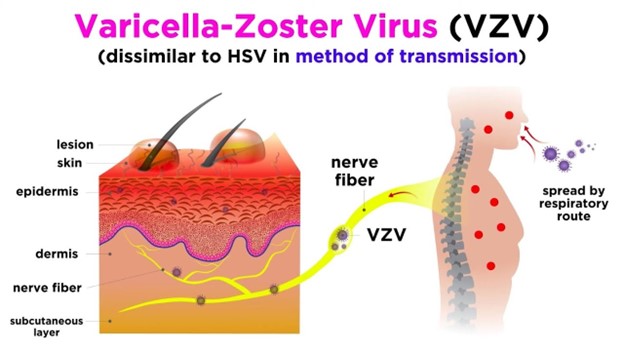A nurse is assisting with the admission of a client who has varicella zoster.
Which of the following interventions should the nurse plan to implement?
Assign the client to a negative pressure airflow room
Have visitors remain at least 0.91 m (3 feet) away from the client
Initiate contact precautions for the client
Administer aspirin if the client develops a fever
Correct Answer : A,C
Varicella zoster is highly contagious, and airborne precautions should be implemented. Assigning the client to a negative pressure airflow room helps prevent the spread of the virus to others by containing and filtering the air within the room.
In addition to airborne precautions, contact precautions should also be implemented. This includes using gloves and gowns when providing care to the client to minimize direct contact with infectious materials.

The other options listed are not appropriate interventions for a client with varicella zoster: While it is important to minimize close contact with an infectious client, varicella zoster is primarily transmitted through airborne droplets. Visitors should follow the appropriate precautions, such as wearing masks and adhering to hand hygiene, rather than just maintaining a certain distance.
Aspirin should not be given to clients with varicella zoster, especially children, due to the risk of developing Reye's syndrome. Reye's syndrome is a rare but serious condition that can cause swelling in the liver and brain. Acetaminophen (paracetamol) is typically recommended for managing fever in clients with varicella zoster.
Nursing Test Bank
Naxlex Comprehensive Predictor Exams
Related Questions
Correct Answer is B
Explanation
During an intravenous pyelogram (IVP), a contrast dye is injected into the client's veins, and X-ray images are taken to visualize the urinary tract. The dye used in an IVP can cause a warming or flushing sensation as it circulates through the body. The client's statement indicates an understanding of this common sensation associated with the procedure.
"I can have a meal up to 2 hours before the procedure": This statement is incorrect. Typically, for an IVP, the client is required to have an empty stomach before the procedure to ensure accurate imaging results. The client should follow the specific instructions provided by their healthcare provider regarding fasting before the procedure.
"I do not need to sign a consent form before this procedure": This statement is incorrect. Informed consent is required for most medical procedures, including an IVP. The client should sign a consent form after receiving all the necessary information about the procedure, its risks, and benefits.
"I should limit my fluid intake for 2 days after the procedure": This statement is incorrect. After an IVP, it is generally advised to increase fluid intake to help flush out the contrast dye from the body and prevent potential complications. The client should follow the specific instructions provided by their healthcare provider regarding post-procedure fluid intake.
Correct Answer is C
Explanation
explanation:
Adult day care facilities provide a safe and supervised environment for older adults during the day, while their family members or caregivers are at work or unable to be present. These facilities offer various activities, social interactions, and personal care services to support the needs of individuals with dementia and other conditions. Attending an adult day care facility canalso give the client an opportunity to engage with others and maintain cognitive and physical stimulation.
A- Hospice care is generally recommended for individuals with terminal illnesses who are nearing the end of life. It focuses on providing comfort and support to the patient and family during the end-of-life journey.
B- Long-term care facilities may be appropriate for some individuals with advanced dementia who require round-the-clock care and supervision. However, in this scenario, the client's adult child is present and working full time, suggesting that the family intends to provide care at home as much as possible.
D- Community senior centers may offer various activities and programs for older adults, but they may not provide the level of supervision and care required for an individual with early onset dementia during the day, especially if their family member is at work.
Whether you are a student looking to ace your exams or a practicing nurse seeking to enhance your expertise , our nursing education contents will empower you with the confidence and competence to make a difference in the lives of patients and become a respected leader in the healthcare field.
Visit Naxlex, invest in your future and unlock endless possibilities with our unparalleled nursing education contents today
Report Wrong Answer on the Current Question
Do you disagree with the answer? If yes, what is your expected answer? Explain.
Kindly be descriptive with the issue you are facing.
